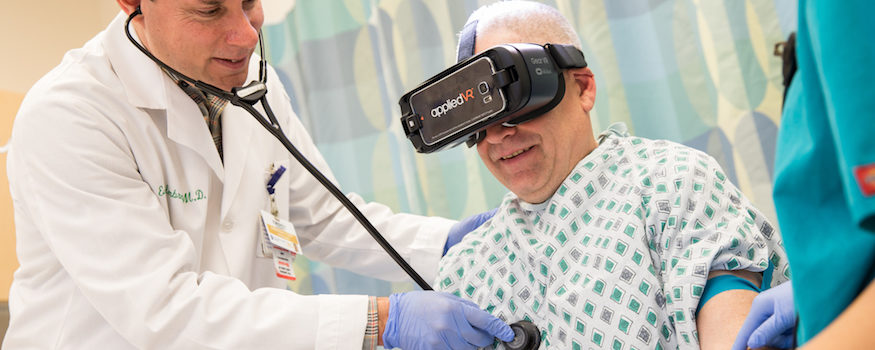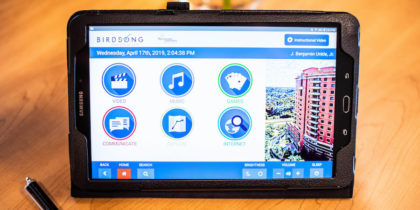Every three seconds someone somewhere in the world develops dementia, says Alzheimer’s Disease International. In 2017, there are 50 million people with dementia worldwide and by 2030, there will be 75 million people with the condition. To counteract a growing need, medical professionals are turning to all different types of technology as a potential care solution.
Virtual reality (VR) technology is now offering new hope to aging dementia sufferers. It’s being used as a tool to connect with patients lost in the fog of declining memory and mobility, and ease some of the symptoms. It is also helping researchers discover ways to diagnose the condition much earlier.
Easing Dementia Symptoms
Dementia symptoms can include stress, agitation and extreme mood swings. The healthcare sector already uses virtual reality to treat pain and anxiety, which makes VR seem like a natural fit to address anxiety-induced dementia symptoms. Several companies are exploring how VR calms patients, rekindles long-forgotten memories and even leads previously uncommunicative patients to speak again.
When a dementia patient is agitated or distressed, they can exhibit compulsive or repetitive behaviors. This can manifest verbally through repetitive moaning, or asking caregivers the same question multiple times. The patient may pace, or continually pick or pull on the clothes they are wearing. Interrupting these behaviors can be difficult for family and even professional caregivers, and increase patient anxiety.
In the healthcare setting, VR has proven an effective distraction technique. Companies Tribemix and Quantum Care have teamed up to create ImmersiCare, which provides virtual reality experiences for dementia patients that present calming scenes. These scenes interrupt the repetitive behaviors, allowing caregivers non-drug alternatives to altering patient mood and stress levels. Tribemix reports its research shows up to a 70 percent stress reduction in patients.
Bringing Human Connection into Healthcare
For the aged, loss of mobility can create a sense of loneliness and lead to depression. Many now use assistive technology to make aging in place possible. While VR can’t actually replace going somewhere in person, for those who can no longer drive or walk with ease, it may be the next best thing. For those seniors currently attempting to age in place, this technology could be a lifeline to an outside world that one can no longer easily reach or navigate.
Even for those currently living in retirement or assisted-living communities, VR offers a chance to reconnect with places many thought they’d never see again. The Rendever system lets users visit a virtual world as a group, creating a social event. While users share the same VR location, they each have an individual experience. Participants talk about what they are seeing and doing. Even when the VR event is over, the participants remain excited and want to discuss it later. This encourages patients access different parts of their brain, and engage with the people around them, helping them stay present.
Create a VR Healthcare Pain Management Program
Explore the key drivers of using VR for pain management and get tips for implementation. Download Now
The impact of the program and the social interaction it encourages can help reduce the isolation and loneliness that the elderly can feel, even when living in a community. It also helps facility managers create a better living experience and improve the lives of their residents.
Rendever also says their tool enables reminiscence therapy, a way to spark memories and discussion from users as they view familiar locations. For dementia patients, memories sometimes become “locked” in their brains, making it hard to recall life events or relatives. Rendever plans for their tool to be used by patient families to create custom tours or experiences. Images of a family home or video tour can bring these memories back to life, helping patients recall past events. When their brains can no longer access the memories on their own, using VR to view pictures or watch tours can stimulate cognition and unlock those memories, potentially slowing the progression of the disease.
Research for Improved Dementia Diagnosis
One of the very first cognitive functions impaired by dementia is spatial navigation. That’s the ability to use landmarks, paths and other environmental clues to determine where you are, where you want to go and the appropriate path for getting there. Researchers at Alzheimer’s Research UK developed a game, Sea Hero Quest VR, the world’s first consumer-focused virtual reality game that helps scientists study human spatial navigation.
The mobile and VR versions of the game are helping the research team develop a baseline for human navigation skills. The research community believes that establishing the baseline for navigation skills will ultimately lead to better diagnostic tests, so a dementia diagnosis can be made earlier and progression of the disease can be tracked. It’s also the first opportunity that users can provide raw, usable data to the scientific community and advance research.
The game works with the Samsung Gear VR headset and can be downloaded from various app stores. Players play the game anonymously while letting the researchers collect data. The research team reports that just two minutes playing the game collects the equivalent of five hours of lab-based research. The VR version of the game builds on the success of their original mobile-based version, which also gathered data on the player’s sense of direction and navigation.
“In a clinical environment, VR allows an even more immersive and intuitive diagnostic assessment of navigation ability in people who may potentially develop dementia. Sea Hero Quest VR allows us to measure more intuitively when people are not sure of their bearings, for example by stopping and looking around. VR therefore has the potential to capture additional complementary data to Sea Hero Quest mobile,” says Michael Hornberger, professor of applied dementia research at the University of East Anglia.
Today, there is no cure for dementia or Alzheimer’s nor any treatments that slow the progression of the disease. Available treatments only aid in managing symptoms. While researchers diligently search for better treatments and even a cure, an earlier diagnosis can help patients and caregivers plan ahead for the social, emotional and financial challenges that a dementia or Alzheimer’s diagnosis brings.
For healthcare providers and facilities that cater to the elderly and dementia patients, VR technology can help address the quality of life and coping challenges that this patient population faces. It can offer a solution that leads to happier, more engaged patients and satisfied families and caregivers.
Learn more about how healthcare technology solutions can enhance efficiencies and improve the patient experience.








